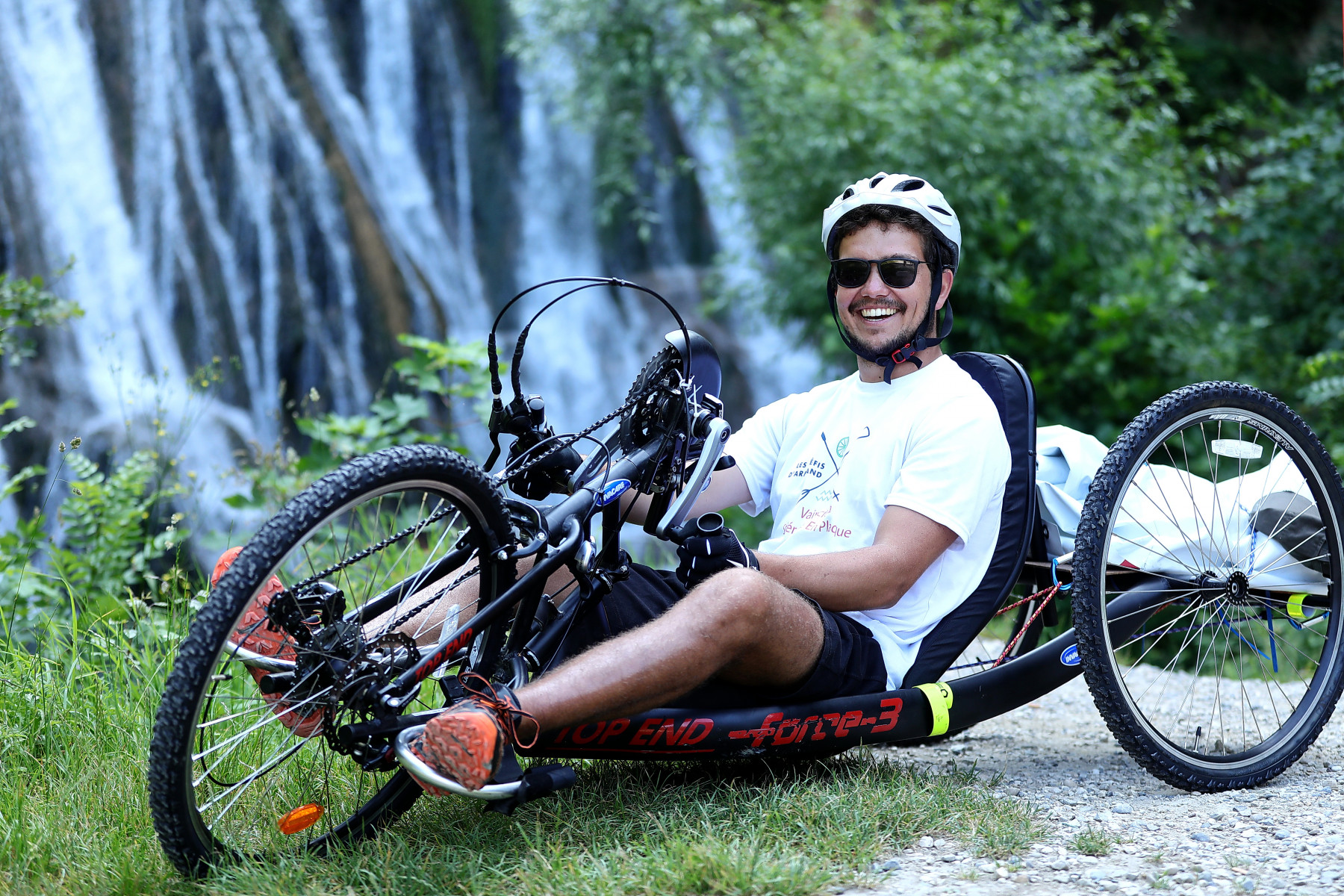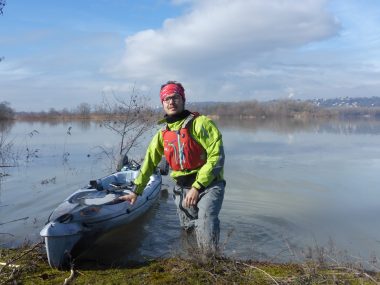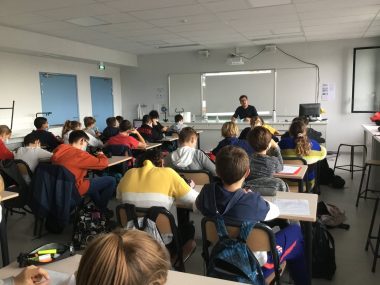Endurance Sports Inspire Young Frenchman With RRMS
Written by |

Armand Thoinet on his handbike. (Photo courtesy of Armand Thoinet)
Sports was a huge part of Armand Thoinet’s life, and when he was diagnosed with relapsing-remitting multiple sclerosis (MS) one week before his 19th birthday, that life turned upside down. He could no longer engage in activities that mattered greatly to him, such as rugby, tennis, and skiing.
“I didn’t accept my illness immediately; it took about three years for me to begin to react,” said Thoinet, 28, a native of Villeurbanne, a suburb of Lyon, France, in an interview with Multiple Sclerosis News Today.
During those three dark years, Thoinet came to two realizations. He needed to focus on the positives of life and return to sports, both of which could help him manage the disease.
“I realized that talking only about negatives, hammering at people about all that had been taken away, wasn’t of any help to me or anyone else,” Thoinet said. “I switched my focus to the positives, to what my disease could bring to me and to others with movement difficulties.”

Armand Thoinet taking on a kayak challenge. (Photos courtesy of Armand Thoinet)
With that mindset, Thoinet regularly gives talks at schools, conferences and elsewhere about his difficult journey with MS and how people with disabilities can be treated better.
At the same time, he’s chasing after personal and world records in endurance sports, including adaptive biking, kayaking, walking, and paddle boating, to help raise money for MS research.
In August 2019, Thoinet said he and three others set a world record as the first physically disabled group to kayak past the 80th parallel north in the Arctic. They were accompanied by four healthy people, two guides, and a cameraman.
COVID-19 has limited Thoinet’s ability to participate in similar endurance events, but like everything else in his life, he found a workaround. He and five friends did a stationary bike relay for a week — 24 hours each day in four-hour shifts — to raise money for the AFM Téléthon, which supports rare disease research and care. Thoinet and all except one rode hand-bike home trainers, traveling a combined 3,600 km (2,237 miles) and raising a total of about €4,500 (about $5,152).
Last year, Thoinet and a friend rode a tandem bike 1,010 km across France in 10 days, and he and his sisters participated in a five-day hike through Auvergne.
Thoinet set up a nonprofit association, called Les défis d’Armand (Armand’s Challenges) in 2015, which has raised a total of $23,000 for research-focused MS organizations. Most of the funds go to the ARSEP Foundation, which translates to the Foundation for Research on Multiple Sclerosis, though it also has sent money to EDMUS (European Database for Multiple Sclerosis), collected and stored at a center in Lyon, whose patient records are used to advance care and disease research.
Participating and training for these activities has helped to overcome some MS symptoms, Thoinet said. When he was diagnosed about 10 years ago, he could walk only 200 meters (220 yards), but with muscle strength gained through his active lifestyle, he says he now can “walk without limit.”
“If I stopped my sports training and my challenges, I know that every walking problem I had will reappear,” Thoinet said. “I must do sports — but for me, that’s not a problem. I love it!”
Exercise and MS
Some research backs up the importance of exercise in MS. A 2020 study funded by The National MS Society, which took guidance from experts in MS, exercise, rehabilitation, and physical activity, recommended that healthcare providers promote exercise and a healthy lifestyle.
For milder cases of MS, they suggested aerobic and resistance training two to three times a week, daily flexibility exercise, and neuromotor exercise three to six times a week.
Thoinet started with rigorous daily training, but realized he wasn’t listening to his body and needed to take time off every now and then. There are periods when he exercises every day, and others where he works out only once or twice a week. He pairs his physical activity with a once-every-six-month infusion of Ocrevus (ocrelizumab), a monoclonal antibody developed by Genentech and approved for use in the European Union in January 2018.

Armand talking with a group of young people as part of his volunteer work.
While Thoinet is extremely active, he doesn’t necessarily recommend the same level for others with MS. But he does encourage people to push themselves as much as they safely can. Participating in theater, for example, forces Thoinet out his comfort zone in a non-physical way — difficulties with speaking and articulating are among his most bothersome disease symptoms.
“The point is to attempt to do things. Attempt despite your failures. Attempt in spite of your successes,” Thoinet said. “The more we try, the more we learn we can do. The principle is to be daring, to go after whatever you imagine you want to do.”
Thoinet still struggles with other MS symptoms, particularly problems with his vision, hearing, and fatigue. But his balance remains strong.
Speech difficulties have made it harder to engage in his volunteer work, where he gives inspirational speeches at conferences and, particularly, at schools. He focuses on the message of shared humanity, disabled or not.
“Talking with young people about what it’s like to be different is important to me. I want to show that being different can also be an opportunity,” Thoinet said. “Volunteering is at the center, the core, of my resurrection with this disease. I volunteer to help young people and share a message of what it means to be human, in the most positive way.”
In a professional setting, he provides peer support for the Lyon Association for the Management of Institutions for Disabled People and serves as an ambassador for outdoor sports with the Department of Isère, a part (akin to a county and its governance in the U.S.) of the Auvergne-Rhône-Alpes region of France and close to his home.
Thoinet also is showing a documentary about his challenges, “Ensemble au bout de monde” (“Together to the End of the Earth”). In the next few months, he plans to bring the film to five nearby cities.
His next planned endurance sport event will take Thoinet on a 650 km pedal boat tour of Corsica, a mountainous island off the southern coast of France. It will count as a world record if realized, he said. Thoinet also plans to participate in a triathlon in October.
Even with all of the challenges associated with MS, Thoinet has been able to thrive in his role as a disability advocate, endurance athlete, and inspirational speaker. He believes he can be an example to others, whether they are disabled or not, helping them to manage whatever life throws their way.
“Young people are able to arrive at an understanding of what I’ve overcome. They don’t have the same problems as me, but they’ve other problems,” Thoinet said. “They start to realize that if Armand can accomplish what he has, given what he’s up against, then I, too, can find a path to succeed.”



